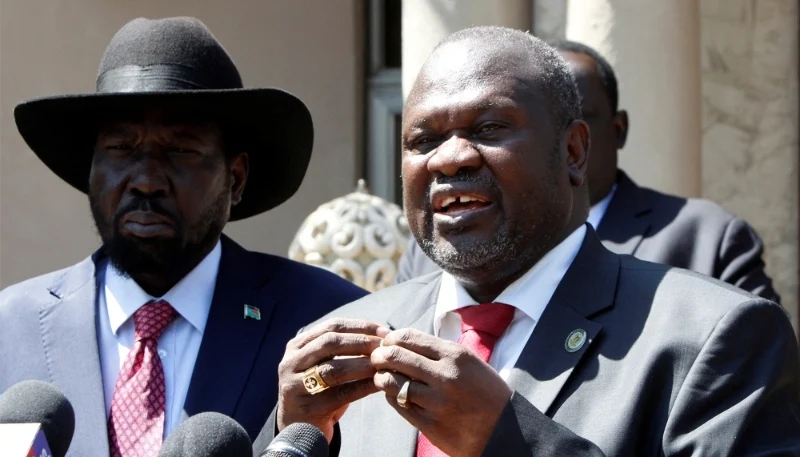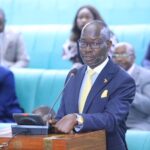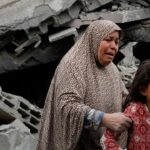South Sudan is teetering on the edge of renewed conflict following reports that First Vice President Riek Machar and his wife, Interior Minister Angelina Teny, have been placed under house arrest by security forces loyal to President Salva Kiir.
The escalating tensions have sparked fears of a return to the violent power struggles that have plagued the country for years.
Local media reported that on Wednesday evening, heavily armed forces, allegedly led by the Minister of Defence, the Chief of Defence Forces, and the head of the National Security Service, stormed Machar’s residence in Juba. The First Vice President’s bodyguards were reportedly disarmed, and an arrest warrant was issued under unclear charges.
A senior member of Machar’s Sudan People’s Liberation Movement-in-Opposition (SPLM-IO) confirmed the development, condemning it as a direct violation of the nation’s Constitution and the Revitalized Peace Agreement (R-ARCSS).
“This act is a blatant violation of the Constitution and the Revitalized Peace Agreement, as no legal procedures such as lifting his immunity have been followed,” said Reath Muoch Tang, Acting Chairperson of the SPLM-IO National Committee on Foreign Relations. “The arrest of the First Vice President without due process undermines the rule of law and threatens the stability of the nation.”
Despite these claims, a highly placed source in Juba refuted the reports, telling The Nile Post that Machar was not under house arrest. “The real news will come out today,” the source said. “The clergy met the president yesterday [Wednesday], and he told them that everything was fine and South Sudan would not go to war again.”
A Familiar Pattern of Political Crackdown
Machar’s reported detention mirrors the events of May 2017, when former army chief General Paul Malong Awan was held under house arrest under similar circumstances. At the time, the Kiir administration repeatedly denied the detention while refusing to provide clear information.
Observers have drawn comparisons to Uganda’s role in both incidents. In 2017, the Uganda People’s Defence Forces (UPDF) were deployed in Juba to bolster Kiir’s government—a scenario that has reportedly repeated itself in the current standoff.
Machar has previously accused Uganda of violating South Sudan’s sovereignty by supporting Kiir’s administration. The friction between the two camps has grown in recent months, with disputes over the implementation of the peace deal, particularly the integration of rival forces into a unified national army, reaching a boiling point.
In early March, President Kiir ordered the arrest of Petroleum Minister Puot Kang Chol and several senior military officials aligned with Machar following violent clashes in the northern town of Nasir. Analysts say these moves reflect Kiir’s growing distrust of Machar and his faction.
Kiir’s Assurances Amid Rising Tension
Despite the growing unrest, President Kiir on Wednesday sought to downplay the fears of conflict during a meeting with church leaders at his office. The South Sudanese presidency released a statement saying the clergy had urged armed groups to denounce violence and prioritize dialogue to prevent the nation from spiraling into another war.
Kiir reportedly reassured the religious leaders of his commitment to peace, saying, “We will not allow this country to return to war. We must resolve our differences through dialogue.”
However, critics argue that the actions taken against Machar and his allies contradict these assurances. “It is hard to believe that peace is the priority when the government is systematically dismantling the opposition,” said a political analyst in Juba who requested anonymity due to the sensitivity of the situation.
International Community Raises Alarm
The United Nations Mission in South Sudan (UNMISS) has expressed deep concern over the developments, warning that the country is at a critical crossroads. In a strongly worded statement, UNMISS Special Representative Nicholas Haysom urged all parties to exercise restraint and uphold the fragile peace agreement.
“Tonight, the country’s leaders stand on the brink of relapsing into widespread conflict or taking the country forward towards peace, recovery, and democracy,” Haysom said.
He emphasized that unilateral actions by any party jeopardize the “hard-won gains of the past seven years” and could plunge South Sudan back into a devastating war.
The African Union and regional bloc IGAD (Intergovernmental Authority on Development) have yet to issue official statements, but diplomatic sources indicate behind-the-scenes negotiations are underway to de-escalate the crisis.
A Nation at the Edge
For many South Sudanese citizens, the political power struggle has reignited painful memories of the country’s brutal civil war, which erupted in 2013 following a fallout between Kiir and Machar. The conflict, which lasted until the signing of the 2018 Revitalized Peace Agreement, left nearly 400,000 people dead and displaced millions.
As tensions continue to rise, the question remains whether South Sudan’s fragile peace can survive the latest political showdown—or if the nation is on the cusp of yet another violent chapter in its history.
For now, all eyes remain on Juba, where the fate of Riek Machar and the country’s future hang in the balance.







